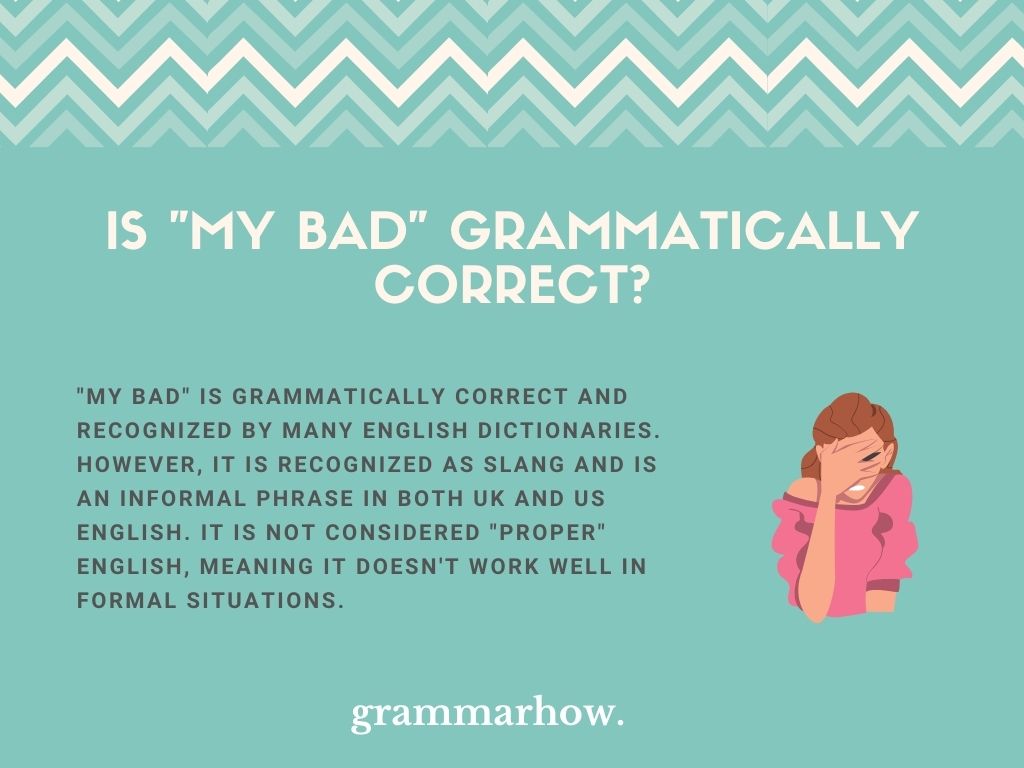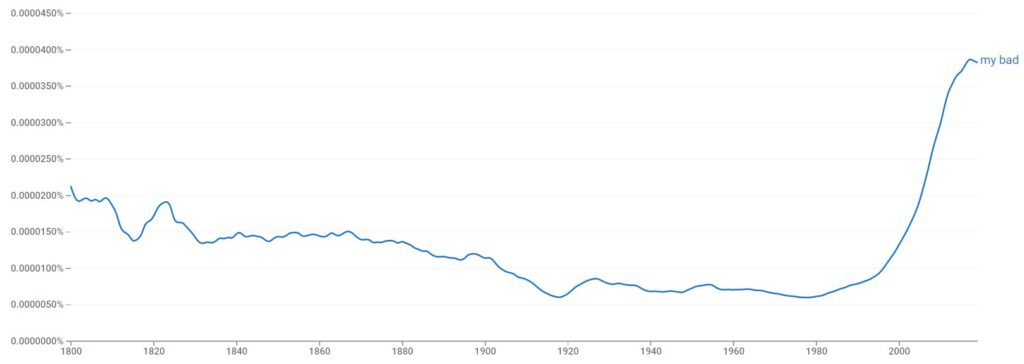The slang phrase “my bad” is fairly common in English. It would help you to know more about it and whether we can define it as proper English or whether it’s strictly a slang phrase. This article will look into it and include alternatives that are better to say.
Is “My Bad” Grammatically Correct?
“My bad” is grammatically correct and recognized by many English dictionaries. However, it is recognized as slang and is an informal phrase in both UK and US English. It is not considered “proper” English, meaning it doesn’t work well in formal situations.

The definition of “my bad,” according to The Cambridge Dictionary, is “used for saying that you accept that you are wrong or that something is your fault.”
We can use the dictionary page above to show that “my bad” is “US informal.” That means we can only use it in informal situations. We can use it when we want to accept that we’re wrong about something, but we typically should avoid it in more formal situations.
What Does “My Bad” Mean?
“My bad” means that we acknowledge and accept that we were wrong about something. We can say it when someone proves us wrong or when we realize that our actions were poor and led to discourse.
Some people believe “my bad” to be incorrect because we usually don’t include the possessive pronoun “my” with an adjective (like “bad”). In this way, it’s incorrect, but we can ignore certain rules like this when we’re working with slang terms.
For example, “my bad” is written to mean something more like this:
- I own this “bad” thing that I did.
“My” is a possessive pronoun and, as such, “bad” becomes the possessed object of the sentence. Since it’s not a noun, we have to cut a few corners (which we’re allowed to do for slang terms). Now, “bad” is the object, and we own it.
Is “My Bad” Proper English Or Slang?
As we’ve stated, “my bad” is slang and not proper English. There are very few instances where it will be acceptable in formal speech or writing. However, it’s widely recognized by native speakers, so it can work in certain formalities.
It’s a very popular slang phrase (perhaps one of the most popular ones out there). Many English speakers know exactly what it means and when to use it, which works well when we want to try and use it in slightly less informal situations.
Of course, the context of when you say it is what’s most important, and you should pay close attention to it. We encourage you to never use the phrase when you’re talking directly to an employer or boss of some kind (unless you know they won’t mind it).
Examples Of How To Use “My Bad” In A Sentence
It might help you to understand how “my bad” is used by looking through some examples. We believe that examples are the best ways to learn how new phrases work in actual contexts.
We can use “my bad” when we want to accept fault or error for some reason. It can relate to a mistake that we’ve made or something that we did that wasn’t very good to do.
- My bad! I didn’t mean to offend you, and it won’t happen again.
- My bad! I didn’t realize there were other people around here.
- Oops, my bad, sorry! I thought I was alone.
- My bad! It won’t happen again; I promise you that!
- Oh, my bad! I thought you said something else.
- My bad! Sorry about that; I wasn’t thinking straight!
- That was really dumb of me. My bad.
- Oops, my bad! I shouldn’t have done that, and I’ll make it right.
- My bad! I could have sworn he said six and not eight!
- My bad! I should have paid closer attention to what the text said.
As you can see, we use “my bad” when we want to claim responsibility for a mistake we’ve made.
We typically only use the phrase with the pronoun “my” because it means we’re accepting responsibility. Changing the pronoun isn’t common practice. For example:
- Your bad
- His bad
- Her bad
None of these possessive pronouns are correct to use. It’s rude to force somebody else to take the blame for something or use “your bad” to tell them they were wrong.
Sometimes, you might also come across:
- Our bad
We can use the possessive pronoun “our” (to refer to more than one person in the second person form). “Our” means that more than one people admit that they were wrong about something.
What Is The Origin Of “My Bad”?
The origin of “my bad” seems to be closely related to sports. We can go further and say that it may well have been basketball that started it.
“My bad” originates from pick-up basketball, where young players would use it to admit an error or fault in the game. It first started becoming common practice in the late 1970s and early 1980s.
It was also nominated for “word of the year” (even though it’s a phrase) in 1999. At the time, it was believed to be at least twenty years older than that.
When Did “My Bad” Become Popular?
If you look at this graph, it gives you a pretty clear idea of when “my bad” became as popular as it is today.

“My bad” became popular in the late 1990s (perhaps linked to the time it was added as “word of the year”). Since then, it has grown exponentially in the 2000s and 2010s.
We can use this graph to see exactly how popular the phrase is in recent times. It’s also interesting to see that the phrase was used in the 1800s as well (though nowhere near as popular).
The earliest recorded usage of the modern slang phrase “my bad” was in the late 1970s. Of course, that means that the iteration of “my bad” used in this graph during the 1800s and early 1900s didn’t mean the same thing.
4 Better Ways To Apologize
There are better ways to apologize (and more formal ways at that). We thought we’d include some of the best ones for you to help you replace “my bad” when you need to.
- Sorry
- My apologies
- It won’t happen again
- I didn’t mean to do that
The preferred version is “sorry” because it works in any situation and every native English speaker knows what it means. It’s also a universal word that many languages understand (even without knowing English).
Sorry
“Sorry” is the best alternative to using “my bad.” It admits a fault or error that we’ve made and allows us to accept full responsibility for our actions. We also say “sorry” to accept whatever consequences come from our actions.
“Sorry” is a universal word that is recognized globally. It’s good to have in your vocabulary and works in both formal and informal situations.
- I’m really sorry I did that!
- I’m sorry, but I didn’t know what else to do!
- I’m so sorry! Can you forgive me?
My Apologies
“My apologies” is the best formal alternative to using “my bad.” It uses “my” as the possessive pronoun, but this time we use an actual noun, “apologies,” to own something and admit our mistake.
“My apologies” works best in formal situations. You’ll rarely hear someone using it in casual situations unless they’re doing it sarcastically or pretending as if they’re posh.
- My apologies. I didn’t see you there.
- My apologies, sir. It won’t happen again.
- My apologies and I’ll make sure to make it up to you.
It Won’t Happen Again
“It won’t happen again” is a good way to admit you made a mistake and that you’re willing to learn from it. Saying “it won’t happen again” means you’ll actively try to avoid any situation which might allow you to make the same mistake.
Generally, we use “it won’t happen again” in all situations. It works casually with friends just as well as it does when you want to admit a fault to your boss and let them know you won’t make the same mistake again.
- It won’t happen again, sir! I’m very sorry about it.
- It won’t happen again. I’ll make sure of that.
- Don’t worry. It won’t happen again.
I Didn’t Mean To Do That
“I didn’t mean to do that” is another way to admit we made a mistake or error. The only difference is that we don’t often take full responsibility for whatever action we took (since we say “we didn’t mean it”).
Saying “I didn’t mean it” typically means we’re not willing to own up to the mistake, even if it’s very clear that we made it.
- I didn’t mean to do that. Sorry.
- I didn’t mean to do that, and it won’t happen again!
- I didn’t mean to do that! That was silly.
What Should I Reply To “My Bad”?
When someone says “my bad,” it’s best to reply with an equal slang response. You can say something like “no problem” or “no worries” if you want to keep your response simple.
Some other responses that you might want to use are:
- No problem
- No worries
- Not a problem
- Don’t worry about it
- It’s okay
- Move on
- Forget about it

Martin holds a Master’s degree in Finance and International Business. He has six years of experience in professional communication with clients, executives, and colleagues. Furthermore, he has teaching experience from Aarhus University. Martin has been featured as an expert in communication and teaching on Forbes and Shopify. Read more about Martin here.
